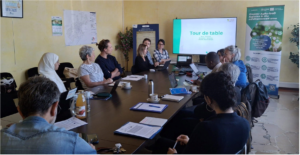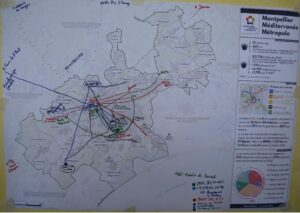Overview
The Montpellier pilot officially launched with a kick-off meeting that brought together seven food solidarity associations selected through FAB’LIM’s Call for Expressions of Interest. This initiative marks the beginning of a collaborative effort to develop a low-impact, cost-effective logistics model for last-mile food distribution.
Building Synergies
During the event, each association introduced itself and shared its motivation for joining the pilot. FAB’LIM outlined the project’s origins and its ambition to reduce both environmental impact and operational costs related to food transport. The collaborative dynamic set the tone for what is expected to become a coordinated logistics system serving the Montpellier metropolitan area.
Workshops and First Insights
Two interactive workshops formed the core of the meeting. In the first, associations mapped their logistics flows, identifying starting points and collection locations. This revealed two high-density zones — in the north and south of Montpellier — pointing to the strategic need for a northern consolidation point to complement the existing M.I.N.
In the second workshop, pre-assigned groups (based on prior data collection) explored pooling opportunities. Key ideas included grouped procurement, coordinated collection days, and shared transport solutions.
Outcomes and Next Steps
Initial discussions underscored a common need to optimize logistics. Concrete operational tools such as consolidation hubs and synchronized schedules emerged as shared priorities.
This kick-off laid the groundwork for future co-design sessions and represents a significant step toward sustainable and collaborative food distributioin Montpellier.




